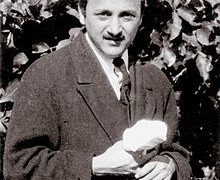Although Baha’is sometimes try to portray Shoghi as being infallible, he himself begs to differ. Here is a letter written on his behalf by his secretary in 1944:
The infallibility of the Guardian is confined to matters which are related strictly to the Cause and interpretations of the Teachings; he is not an infallible authority on other subjects, such as economics, science, etc.
Reference: http://bahai-library.com/compilation_socrates_bwc (retrieved 18/2/2014)
He clearly says that he is not infallible in science. With this quote at hand there is no need to put forward any of his errors and unscientific words that exist in his translations, history books, letters, and elsewhere.
Furthermore, if one errs in one subject there is no guarantee that he won’t err in another, and thus there is no guarantee that Shoghi won’t err in matters related to the Baha’i cause and its interpretations. There is a article called Socrates compiled by the Research Department of the UHJ:
We must not take this statement too literally; “contemporary” may have been meant in Persian as something far more elastic than the English word. Likewise, the whole translation probably needs revising (15 February 1947).
Reference: http://bahai-library.com/compilation_socrates_bwc (retrieved 18/2/2014)
Pay attention to the words probably and may. Would one expect these words from someone assigned by a divine figure to be the sole interpreter of Baha’i works? Is this how he interprets Baha’i works: by saying maybe and probably?! He also makes a mistake regarding the work he is referring to and believes the original words were uttered in Persian whilst they were uttered in Arabic.
Socrates is available online, readers may visit: http://bahai-library.com/compilation_socrates_bwc (retrieved 17/2/2014). This article points out to a few more historical errors in `Abdu’l-Bahā’s words regarding the prophets and philosophers.
There are other instances:
Concerning the different translations of the Words. It is surely the original text that should never be changed. The translations will continue to vary as more and better translations are made. Shoghi Effendi does not consider even his own translations as final, how much more translations made in the early days of the Cause in the West when no competent translators existed (From a letter on behalf of the Guardian to John Hyde Dunn, 14 August 1930)
Reference: http://bahai-library.com/compilation_provisional_translations (retrieved 18/2/2014).
Shoghi Effendi does not consider his own translations as final. Apparently, in this creed, everything is subject to change and error prone. We ask again, how can someone fulfill the station of being the authoritative interpreter of Baha’i works when he constantly expresses doubts and is unsure of his own translations and interpretations?






